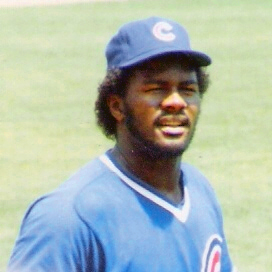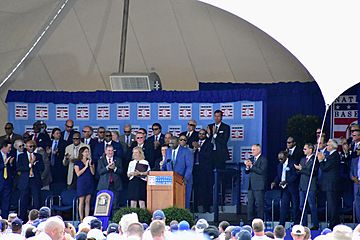Lee Smith (baseball) facts for kids
Quick facts for kids Lee Smith |
|||
|---|---|---|---|

Smith with the Chicago Cubs in 1985
|
|||
| Pitcher | |||
| Born: December 4, 1957 Jamestown, Louisiana, U.S. |
|||
|
|||
| debut | |||
| September 1, 1980, for the Chicago Cubs | |||
| Last appearance | |||
| July 2, 1997, for the Montreal Expos | |||
| MLB statistics | |||
| Win–loss record | 71–92 | ||
| Earned run average | 3.03 | ||
| Strikeouts | 1,251 | ||
| Saves | 478 | ||
| Teams | |||
|
|||
| Career highlights and awards | |||
|
|||
| Induction | 2019 | ||
| Vote | 100% | ||
| Election Method | Today's Game Era Committee | ||
Lee Arthur Smith (born December 4, 1957) is a famous American former professional baseball pitcher. He played for 18 years in Major League Baseball (MLB) for eight different teams. Lee Smith was known as a powerful closer, which is a special type of relief pitcher who finishes games.
He was the first pitcher ever to reach 400 saves, which means he closed out 400 games where his team was winning. From 1993 until 2006, he held the major league record for career saves with 478. Later, Trevor Hoffman passed his record. Lee Smith was chosen for the National Baseball Hall of Fame in 2019.
Smith was a very tall and strong pitcher, standing 6 feet 6 inches (1.98 meters) tall and weighing 265 pounds (120 kg). He threw a super-fast fastball that could reach 95 miles per hour (150 km/h). In 1991, he set a National League record with 47 saves for the St. Louis Cardinals. He led the National League in saves three times and the American League once. When he retired, he was third in the number of games pitched (1,022). He still holds the record for career saves for the Chicago Cubs (180) and used to hold it for the Cardinals (160).
After his playing career, Smith became a pitching instructor for the San Francisco Giants. He also coached the South Africa national baseball team in the World Baseball Classic in 2006 and 2009.
Contents
Early Life and Baseball Start
Lee Smith grew up in Castor, Louisiana. His favorite sport in high school was basketball. He didn't even play baseball until he was a junior! He said he only started playing because his brother bet him $10 that he couldn't be a catcher. A famous baseball scout named Buck O'Neil, who played in the Negro leagues, discovered Lee Smith's talent.
Playing in the Pros
Drafted and Minor Leagues
At 17, Lee Smith was picked by the Chicago Cubs in the 1975 MLB draft. The Cubs signed him for $50,000, plus money for his education.
Smith started his professional career as a starting pitcher in the minor leagues. He played in different levels of minor league baseball from 1975 to 1980. In 1978, he had trouble controlling his pitches, walking many batters. When the team moved him to the bullpen (where relief pitchers wait), he almost quit. But former Cubs player Billy Williams convinced him to keep playing. In 1980, he played in Triple-A and recorded 15 saves.
Chicago Cubs (1980–1987)
Lee Smith made his major league debut with the Cubs on September 1, 1980. He pitched one inning without allowing any runs and got his first MLB strikeout. He played in 18 games that season as a relief pitcher. His first major league save happened on August 29, 1981.
In 1982, Smith started five games, which were his only starts in his entire major league career. He even hit his first MLB home run on July 5, 1982! He only got two more hits in his career.
A former Cubs pitcher, Ferguson Jenkins, helped Smith a lot. Jenkins taught him how to simplify his pitching style and how to throw new pitches like the slider and forkball. After that, Smith became the Cubs' main closer, leading the team in saves from 1983 to 1987.
In 1983, Smith had his best season with a very low earned run average (ERA) of 1.65. He led the National League with 29 saves and was chosen for his first All-Star Game.
The 1984 Cubs made it to the playoffs for the first time since 1945. Smith saved more than 30 games that year. In the playoffs, he helped the Cubs win one game, but they eventually lost the series.
In 1985, Smith became even better at striking out batters, getting 112 strikeouts in less than 98 innings. He continued to save over 30 games for the Cubs even when they had losing seasons. In 1987, he was picked for his second All-Star Game. He pitched three extra innings and got the win when his team scored. Players said it was scary to face Smith's "pure gas" fastball at Wrigley Field at night, especially since the stadium didn't have lights back then.
After the 1987 season, Smith was traded to the Boston Red Sox.
Boston Red Sox (1988–1990)
The Red Sox got Lee Smith to make their bullpen stronger. In 1988, he had a good ERA of 2.80. The Red Sox won their division and made it to the playoffs. Smith pitched in two playoff games, but the Red Sox lost the series.
In 1989, Smith continued to pitch well, striking out many batters. By the end of the 1980s, Lee Smith had 234 saves, making him one of the best relief pitchers of that time. In May 1990, the Red Sox traded Smith to the St. Louis Cardinals. He had 58 saves during his time with Boston.
St. Louis Cardinals (1990–1993)
Smith joined the Cardinals in May 1990. He had 27 saves that year and pitched very well.
In 1991, Smith had an amazing season, setting a career-high with 47 saves. He broke the National League record for saves. This was the first of four years in a row where he had over 40 saves. He won his first Rolaids Relief Man Award, which goes to the best relief pitcher. He also finished second in the voting for the Cy Young Award, given to the best pitcher.
Smith led the National League in saves again in 1992 with 43 saves and won his second Rolaids Relief Man Award. He also had a streak of 546 games without making an error, which was a National League record for pitchers for a long time.
In 1993, Smith broke the MLB career saves record on April 13, getting his 358th save. He also broke the National League career saves record the next day. In June, he set an MLB record for the most saves in any single month with 15. In August, the Cardinals traded Smith to the New York Yankees. He left the Cardinals as their all-time saves leader with 160 saves.
New York Yankees (1993)
The Yankees were trying to win their division when they got Smith. He pitched very well for them, not allowing any runs and getting three saves in eight games. However, the Yankees didn't make the playoffs that year.
Baltimore Orioles (1994)
In 1994, Smith signed with the Baltimore Orioles. He had a great start to the season, with 12 saves and no runs allowed in his first 12 games. He was chosen for his sixth All-Star Game. In the All-Star Game, he gave up a game-tying home run. The season ended early due to a player strike. Smith finished with 33 saves and won his third Rolaids Relief Man Award.
California Angels (1995–1996)
Smith signed with the California Angels for the 1995 season. He set a new major league record by saving 19 games in a row! He was chosen for his seventh and final All-Star Game, becoming one of only a few players to be an All-Star for four different teams. The Angels had a big lead in their division but lost many games at the end of the season and missed the playoffs. Smith still had 37 saves that year.
In 1996, Smith had knee surgery and spent some time in the minor leagues for the first time since 1980. When he returned, he wasn't happy with his role on the team, and the Angels traded him.
Cincinnati Reds (1996)
Smith was traded to the Cincinnati Reds in May 1996. He mostly pitched in a setup role, helping the team's main closer. He appeared in 43 games for the Reds. After the season, the Reds let him become a free agent.
Montreal Expos (1997)
Smith joined the Montreal Expos for what would be his final season in 1997. His last game was on July 2. After struggling with his pitching, Smith announced his retirement on July 15.
After Playing Baseball
Even after retiring, the Kansas City Royals tried to sign Smith in 1998, but he decided not to play. He later signed a minor league deal with the Houston Astros but retired again after a few games.
Lee Smith played in 1,022 major league games. He finished his career with a record of 71 wins and 92 losses, along with 478 saves. He struck out 1,251 batters.
Life After Retirement
Two years after retiring, Lee Smith became a pitching instructor for the San Francisco Giants in the minor leagues. He enjoyed teaching young players. He also coached the South Africa national baseball team in the World Baseball Classic in 2006 and 2009.
Lee Smith has three children from a previous marriage: Nikita, Lee Jr., and Dimitri. He also has twins, Alana and Nicholas, from his current marriage.
Hall of Fame Journey
Becoming a Hall of Famer
In 1995, a sportswriter named Jim Murray said Lee Smith was the player most likely to get into the National Baseball Hall of Fame. He called Smith "the best one-inning pitcher the game ever saw."
When Smith retired, there was a lot of talk about whether he would make it into the Hall of Fame. At that time, only a few relief pitchers had been inducted. Over the years, more closers like Dennis Eckersley, Bruce Sutter, and Goose Gossage were elected. Smith had a very high save percentage, meaning he successfully closed out games most of the time.

For many years, baseball writers voted for players to enter the Hall of Fame. Smith was on the ballot from 2003 to 2017. He received a good number of votes but never quite reached the 75% needed for induction.
Hall of Fame Election
After not being elected by the baseball writers, Lee Smith was considered by a special group called the Today's Game Committee. On December 9, 2018, Lee Smith and another player, Harold Baines, were chosen for the Hall of Fame! They both received enough votes from the committee.
The official induction ceremony took place in Cooperstown, New York, on July 21, 2019. Lee Smith, Harold Baines, and other great players like Roy Halladay, Edgar Martínez, Mike Mussina, and Mariano Rivera were all inducted. In his speech, Smith thanked his hometown, saying, "It wasn't just my arm that got me here. It's the whole community of Castor. I thank you."
More About Lee Smith
- List of Major League Baseball annual saves leaders
- List of Major League Baseball leaders in games finished
- Major League Baseball titles leaders
- List of St. Louis Cardinals team records
 | Calvin Brent |
 | Walter T. Bailey |
 | Martha Cassell Thompson |
 | Alberta Jeannette Cassell |

